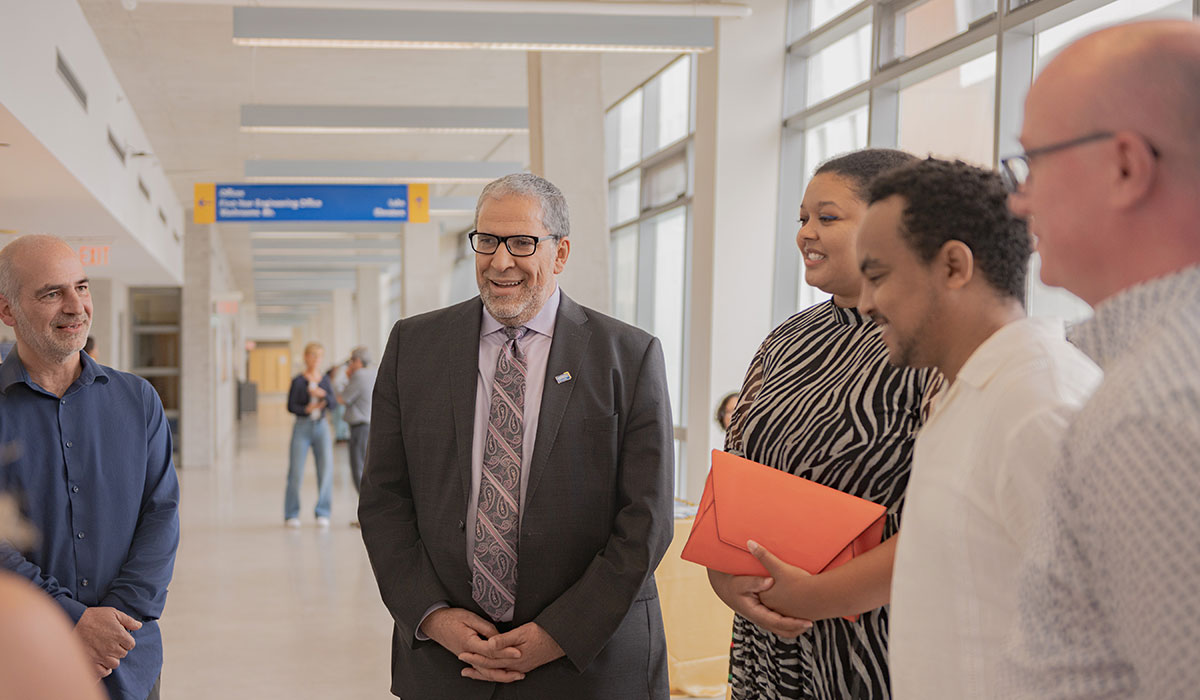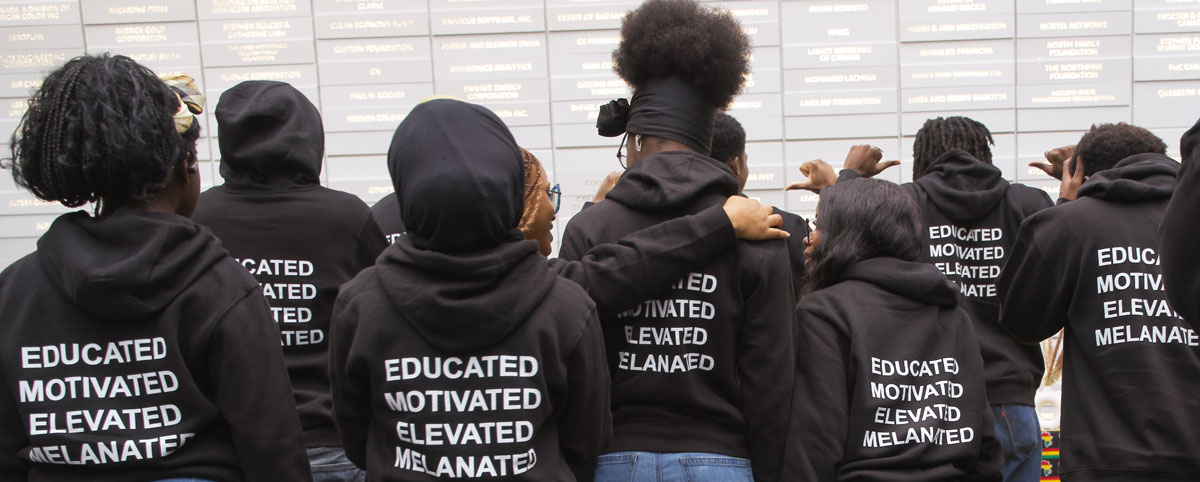Cultivating Black Flourishing
The Presidential Implementation Committee to Confront Anti-Black Racism Three-Year Milestone Report and Beyond

“If our roots have been strong enough to withstand harsh and sometimes uninhabitable conditions, imagine the growth that might emerge when equipped with fertile soil, intentional care and the right tools.”
— Grace-Camille Munroe, Interim Director of the Black Scholarship Institute and former Program Manager of the Presidential Implementation Committee to Confront Anti-Black Racism

- Letter from President Mohamed Lachemi
- What you water will grow
- Introduction
- Summary of progress on implementing recommendations
- Student recommendations
- Staff recommendations
- Faculty recommendations
- Office of the Vice-President, Equity and Community Inclusion recommendation
- Closing letter from the Vice-President, Equity and Community Inclusion, Tanya De Mello


President Mohamed Lachemi and Dean of the Faculty of Community Services, Kiaras Gharabaghi, welcome the university’s inaugural cohort of the Black postdoctoral fellowship (2023).
Letter from President Mohamed Lachemi
A commitment to equity, diversity and inclusion, including the dismantling of systemic and anti-Black racism and creating an environment where Black students, faculty and staff can flourish, has long been a core value of Toronto Metropolitan University (TMU).
As an institution, we have been intentional about living this commitment in many ways: by prioritizing the hiring and retention of Black faculty and staff, creating opportunities to engage in cross-cultural learning and dialogue and in centring the experiences of Black people in our community. TMU’s Viola Desmond Awards, for example, which celebrate phenomenal Black women connected to the university, began fifteen years ago.
Despite this, Black students, faculty and staff have shared that many gaps have continued to persist. In response, the university launched the Anti-Black Racism Campus Climate Review in 2019. The review resulted in the formalization of a detailed call to action and the creation of the Presidential Implementation Committee to Confront Anti-Black Racism (PICCABR), which together have led to significant steps to address racial disparity across the university.
From reimagining the performance development process to centre equity, diversity and inclusion and strengthening the pipeline of qualified Black faculty, to cultivating more intentional spaces of belonging for Black students, the PICCABR, alongside stakeholders from across campus, has been dedicated to bolstering the conditions for Black flourishing at TMU. These efforts coincide with the changing of the university’s name as well as the signing of the Scarborough Charter, marking a significant new chapter for the university that prioritizes our commitment to equity and inclusive excellence in everything we do.
While we have been doing this work for a significant period of time, the actions and goals formalized through the PICCABR’s work have propelled us forward, resulting in significant gains. It is my pleasure to introduce this report on our progress as a demonstration of our commitment to dismantle systemic anti-Black racism and create an environment where Black students, faculty and staff can flourish. While much of this early work can be seen and experienced by our community members, the growing and collective impact of these efforts is significant, laying the groundwork for more equitable practice to become deeply embedded in our systems, operations, decision making and how we show up in relationship with one another. This report marks how far we have come, but equally importantly, it provides a roadmap for sustaining these efforts and for the important work still to come.
Meaningful change requires commitment, bold leadership, institutional investment and collective effort. We each have an important role to play in confronting anti-Black racism. Remaining steadfast in our commitment is a responsibility we must uphold for our students, faculty, staff and alumni—now and in the future.
As you read through this report, I encourage you to reflect, initiate conversations with fellow community members and join us in cultivating Black flourishing at TMU.
It is my hope that together we can continue to forge a university community where all members can belong and explore the possibilities of all that they can be.
Sincerely,
Mohamed Lachemi
President and Vice-Chancellor, Toronto Metropolitan University

What you water will grow
As a young girl growing up in rural Jamaica, I often watched my grandmother tend to her farm. She would spend hours patiently preparing the soil, pulling out weeds, mulching, pruning, and watering. She worked with intention and purpose. When I asked why she took so much care to tend the soil, she would simply look at me and say, “What you water will grow.” And it did. My grandmother’s crops flourished throughout the years, creating an abundance she always shared so that others in the community would never go hungry.

Grace-Camille Munroe (Alyssa K. Faoro, 2022).
I often find myself thinking back to my grandmother’s farm. More specifically, I believe that the conditions that once allowed my grandmother’s sweet potatoes, tomatoes, and callaloo to thrive underline the same principles of care and nourishment needed for Black folk to flourish.
Black flourishing seeks to cultivate the conditions whereby more Black people can thrive and be excellent without first enduring or being defined by racial trauma. Here, anti-Black racism can be understood as a contaminant to the soil that must be uprooted, not a characteristic of the crop.
We don’t want to address the effects of anti-Black racism at the university solely; we aspire towards a vision of Black flourishing that is normalized, inclusive of and responsive to the diverse and unique needs of the Black/African Canadian community.
What you water will grow. If our roots have been strong enough to withstand harsh and sometimes uninhabitable conditions, imagine the growth that might emerge when equipped with fertile soil, intentional care and the right tools. I believe that Black flourishing symbolizes nourishment and sustenance for the spirit and soul of Black folk. When Black flourishing is achieved institutionally, there is shared abundance through which others across the university community can thrive and prosper.
Grace-Camille Munroe
Interim Director of the Black Scholarship Institute and former Program Manager of the Presidential Implementation Committee to Confront Anti-Black Racism


High school students from Toronto District School Board’s Centre of Excellence for Black Student Achievement at the Black Scholarship Institute launch (2023).